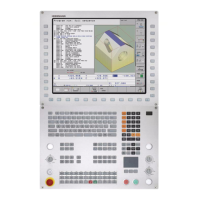July 2013 8.6 DCM – Dynamic Collision Monitoring 1449
As an alternative, the X, Y and Z columns can be used for the description of
transformations, but then no entry is permitted in the AXIS column. If there is
an entry in the AXIS column, the X, Y and Z columns are ignored.
The new definition table for HEAD_Addition:
Transformations in the CMO definition table must always occur before the
definition of objects. These transformations only serve to describe the position
and orientation of the CMOs, and do not need to be canceled in order to
describe the further kinematics of the machine. If there is a transformation at
the end of a definition table, the error message Kinematic table defective is
output.
Excluding the TT for
tool measurement
During tool measurement with a TT, the CMO protecting the TT can
automatically be excluded from collision monitoring.
A CMO that has been identified correspondingly will then automatically be
excluded during the execution of touch probe cycles TCH PROBE 30/31/32/33
or 480/481/482/483. The CMO for the touch probe is identified by entering
TT_ENABLE_PROBING in the DOC column of the kinematics table.
The CMO identified in this way will be excluded from collision monitoring
before the beginning of the touch probe cycle. At the end of the cycle or when
the cycle is canceled, the CMO will automatically be included in collision
monitoring again.
Another possibility for excluding an identified CMO from collision monitoring
is to use the function FN 17: SYSWRITE ID 990. The function
FN 17: SYSWRITE ID 990 NR6 = 1 causes switching to input X13. The CMO is
then excluded from collision monitoring for as long as X13 is active.
The following must be kept in mind:
You can use TT_ENABLE_PROBING for only one CMO.
If a touch probe cycle is canceled with the EXTERNAL STOP soft key, the
tool (TT) should be retracted in the Manual Operation mode before pressing
the INTERNAL STOP soft key. The INTERNAL STOP soft key results in the
CMO being included in collision monitoring again, and the tool would then
be immobilized by collision monitoring. DCM would trigger an error
message reporting a distance < 2 mm. The tool (TT) can then not be
retracted until collision monitoring has been switched off.
After retraction from the measuring point, the tool (TT) must be located
sufficiently far from the area for which protection is active again. After
retraction, the distance must be > 5 mm. This safety clearance can be
defined in MP6540.x.
NR KEY X Y Z AXIS COORD RADIUS HEIGHT DOC
1 Trans -140 70
2 Trans B 135
3 Cuboid -40 -20 -40 HEAD
Addition
4400040
[END]

